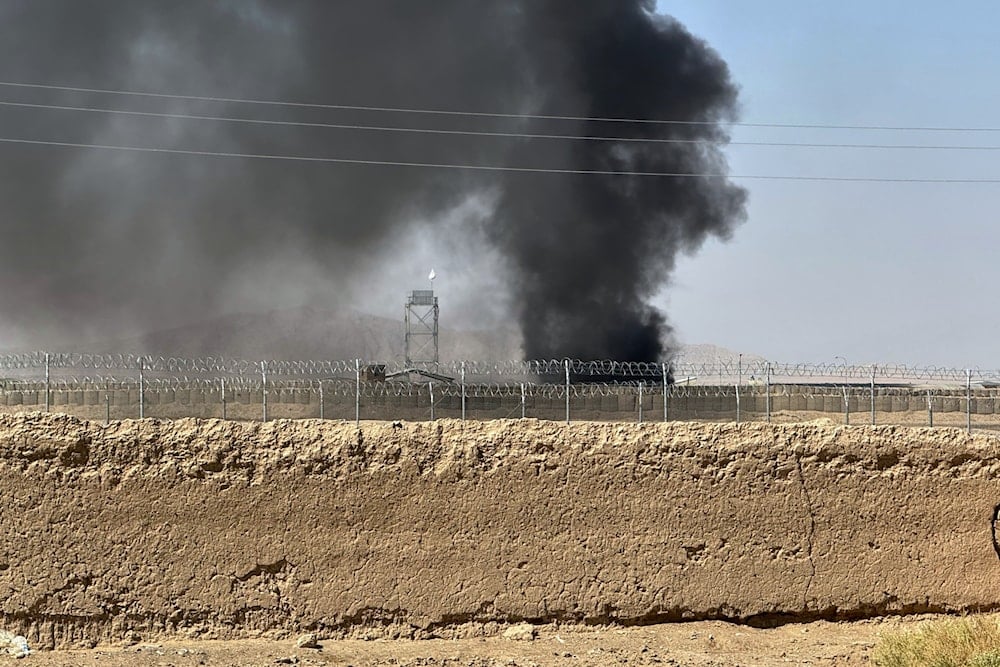Afghanistan-Pakistan truce talks collapse in Istanbul talks
Peace talks between Afghanistan and Pakistan in Istanbul ended without resolution, as tensions over Tehreek-e-Taliban activity and recent border clashes derail efforts to maintain the October ceasefire brokered in Doha.
-

Smoke goes up after a shell exploded in a border area during clashes between Pakistan and Afghan forces, as seen from the Pakistan side of the border near Chaman, Pakistan, on October 15, 2025. (AP Photo/H. Achakzai)
Efforts to broker a lasting ceasefire between Afghanistan and Pakistan have failed, as talks held in Istanbul concluded without resolution, according to sources familiar with the matter. The breakdown in dialogue marks a setback for regional stability following the deadliest cross-border violence since the Taliban assumed power in Kabul in 2021.
Mediated by Turkey and Qatar, the second round of negotiations aimed to build on a previously agreed ceasefire, reached in Doha on October 19, after clashes left dozens dead along the border. However, sources from both sides blamed each other for the failure of the Afghanistan-Pakistan truce talks.
A Pakistani security source told Reuters the talks faltered because the Taliban refused to take responsibility for curbing the activities of the Pakistani Taliban, a separate militant group hostile to Islamabad that operates within Afghan territory.
An Afghan source familiar with the talks also described "tense exchanges," according to Reuters, saying that Kabul had reiterated it holds no authority over the Pakistani Taliban, which has recently launched attacks on Pakistani military targets near the 2,600-kilometer shared border.
The October ceasefire followed Pakistani airstrikes in Kabul and other Afghan areas, targeting senior figures in the Pakistani Taliban. In retaliation, the Taliban carried out coordinated attacks on Pakistani military posts, further straining the already fragile truce. Although both sides formally agreed to halt hostilities, ongoing border clashes have cast doubt over the viability of any long-term agreement.
Pakistani Taliban activity sparks dispute
The core disagreement in the breakdown of Taliban-Pakistan negotiations remains the presence and activity of the Pakistani Taliban (Tehrik-i-Taliban Pakistan or TTP) in Afghanistan. Additionally, Islamabad holds the Taliban government accountable for allowing the group to operate freely and attack Pakistani forces, while Kabul continues to deny any operational control over the TTP.
According to Reuters, sources familiar with the matter spoke anonymously due to the sensitivity of the negotiations, and officials from the Taliban and the Pakistani government did not respond to requests for comment.
The failure of the Istanbul peace talks comes amid warnings of renewed escalation. Pakistan’s Defense Minister recently stated that while Kabul "wants peace," the inability to reach an agreement could mean "open war."
Despite the standing ceasefire, weekend clashes resulted in the deaths of five Pakistani soldiers and 25 militants from the Pakistani Taliban, according to a statement by Pakistan’s military on Sunday.
The continued instability along the Afghanistan-Pakistan border threatens not only bilateral relations but also broader regional security, as international observers monitor the growing tension between Taliban-controlled Afghanistan and nuclear-armed Pakistan.

 3 Min Read
3 Min Read










